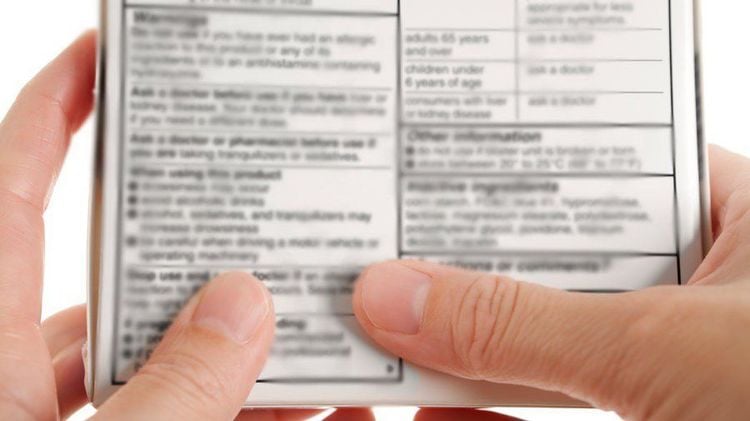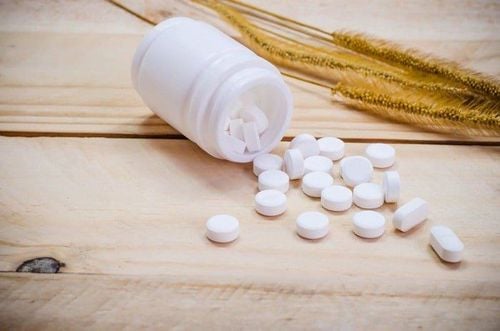This is an automatically translated article.
Prescription drugs can help you effectively relieve pain, reduce inflammation, and manage many problems that affect your health and daily life. But in order for that prescription to be taken as safely and effectively as possible, it must be taken in the correct way and in the correct dose as directed by your doctor. However, many patients do not follow the correct steps when taking prescription medications, and make common mistakes when using medications to treat their illness.
There are many mistakes that patients can make when using drugs, below are the most typical and common cases.
1. Take the wrong time to use the medicine during the day
The time to use the drug can be specified in the sessions of the day such as morning, noon, evening or according to the meals such as taking before or after eating. Choosing the right time to take your medicine plays an important role in how to use it safely and effectively. Usually the doctor or pharmacist will be the one to give instructions to the patient when to use the drug, or sometimes in the instruction sheet included in the drug package, there is also an indication of when to take the medicine. For example, a doctor may instruct a patient to take a blood pressure medication in the morning, because taking it at night may cause a patient's blood pressure to drop too low. So when people are prescribed medication and it's mentioned what time of day it should be taken as a rule of thumb, not a recommendation, no matter what medication people are taking.
2. Ignore the medication instructions
Berger says, some medications like thyroid medications need to be taken on an empty stomach, because when food is present, food will interfere with the absorption of medications and make them less effective. But some other medicines, such as antibiotics and OTC (over-the-counter) anti-inflammatory drugs, are advised to be taken with food (after eating) for a reason if taken first. When ingested, the drug or some of its ingredients can erode the stomach lining over time, causing pain and bleeding. Berger also explained that eating ahead of time as directed will help patients ensure their stomachs have been coated and avoid irritation to the ingredients of the drug.

Người bệnh thường bỏ qua thông tin hướng dẫn sử dụng thuốc của nhà sản xuất
3. Reduce the dose of medicine with improper food
Some foods and drugs, when combined in the process of eating or digesting food in the stomach, can cause beneficial or harmful side effects (more seriously, poisoning the user). use). Depending on the type of drug and the extent of its effects, side effects can vary.
For example, grapefruit is a widely used fruit in everyday life, but it can cause some drugs to enter the patient's bloodstream too much or too little. This can make some medications less effective and can cause major side effects such as kidney failure. On the other hand, some foods can help increase the effect of the drug, such as when using vitamin D (a drug available at drugstores and prescribed by many doctors in prescriptions), vitamin D is easily dissolved. Fat-soluble, so when using vitamin D, patients should use fatty foods to make vitamin D easily absorbed. So to make sure you don't use foods that have a bad reaction to your medicine, you should talk to your doctor and pharmacist to know what foods you are using when combined with drugs. no and will certainly do as they please.
4. Using prescription drugs with certain other medications or OTC vitamins
"People think over-the-counter medication means it's safe to take, but most of those drugs can have poor interactions with prescription medications," says Berger. Experts also advise caution when mixing prescription drugs with certain vitamins. For example, taking heartburn pills along with vitamin supplements will render both medications ineffective due to the body's inability to absorb them simultaneously.So people need to be careful when using any medicine or vitamin other than a doctor's prescription. However, people should not worry because pharmacists know a lot about drugs and can guide users to avoid harmful interactions with drugs. Therefore, when a patient or family member goes to buy medicine, it is advisable to ask the pharmacist before using many other drugs or supplements, vitamins at the same time.

Người bệnh có thể nhờ sự hỗ trợ từ dược sĩ về cách dùng thuốc an toàn
5. Skip a dose or don't take it as directed
It is becoming all too common to adjust the dose of medication or quit smoking completely without the consent of the doctor, especially among people who take drugs for chronic diseases and take long-term drugs such as high blood pressure, cardiovascular diseases. In many cases, patients arbitrarily adjust the dose of medicine such as taking medicine every other day or only using half of the prescribed dose for many reasons such as forgetting to take the medicine, wanting to save money or thinking that the prescribed dose is not enough. is too high.
In fact, this is a very bad idea and can have serious consequences for the patient. Medicines need to be supplemented in sufficient doses to maintain a stable level in the patient's blood, if excess or lack of that amount will make the condition worse. If the patient's burden is on the cost of medication, talk to your doctor to see if he or she can recommend some other more appropriate, more cost-effective prescription.
6. Improper storage of medicines
Many people have a habit of buying many drugs at one time, which is not advisable, the US National Library of Medicine has issued a note that all environmental factors can damage medicines and make them ineffective more efficient, including temperature, humidity and light. The best place to store medicines is a cool, dry place like a shelf in a closet or on top of the office.
7. Choose a prescription from different pharmacies
There are quite a few pharmacies located near or far from your home, it can be convenient to buy some prescriptions at the office store and good prescriptions at another pharmacy near your home. If the stores have a connection with each other like the same business establishment, it is very convenient for buyers. But without alignment, the problem becomes worrisome.
Each store will receive drugs from many different sources, many different pharmaceutical companies. Although the name of the drug is the same, it is possible that the ingredients and quality are different, making it difficult for pharmacists to see the right medicine for the patient. Or some patients who buy their own and over-the-counter drugs will receive different drugs at different pharmacies for the same disease. Berger recommends that people keep an up-to-date list of all the medicines they take or keep a record of used packs, that way it's easier for pharmacists to get the right medicine for them. .
Please dial HOTLINE for more information or register for an appointment HERE. Download MyVinmec app to make appointments faster and to manage your bookings easily.
Reference source: webmd.com; womansday.com; pharmacytimes.com












